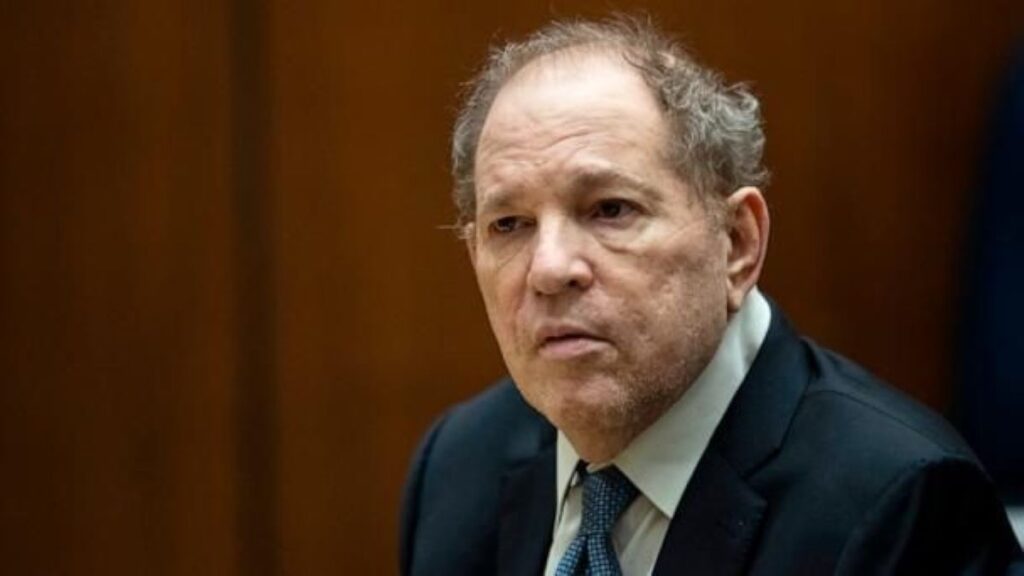The New York Court of Appeals reversed film producer Harvey Weinstein’s 2020 rape conviction in a stunning reversal of events. This ruling significantly impacts the #MeToo movement and the judicial system’s capacity to hold influential people responsible.
Harvey Weinstein, a renowned Hollywood producer, was found guilty of committing sexual assault in 2020. Consequently, his victims felt a sense of justice. An important turning point in the #MeToo movement was the historic trial, which gained steam in 2017 as other women came forward with accusations against Weinstein. His conviction was a significant win for victims of sexual assault and harassment.
The New York Court of Appeals found that the trial judge for Weinstein had made significant errors. According to the court, the testimony served no considerable purpose and portrayed the defendant in a highly prejudicial light.
The Manhattan District Attorney’s Office said that should the accused victims agree to reappear, Weinstein will face a new trial. Despite several unfavorable court decisions, the Weinstein team nervously awaited a surprising favorable outcome.
ALSO READ: Authorities Storm Diddy’s Properties Amid Sexual Assault and Rape Allegation Probe
With this judgment, a traumatic chapter in America’s history about sexual misbehavior by influential people is once again opened. On the witness stand, those who came forward to testify against Weinstein could have to go through their horrors all over again.
After his first conviction, Weinstein, 72 years old, was given a 23-year sentence that he was to serve in a New York jail. Additionally, Weinstein allegedly exploited young actresses with his power in the entertainment industry, forcing them into unwanted sexual relationships. Weinstein signed eight settlements with women for sexual assault allegations in a 2017 New York Times article.
POLL — Should Abortion Be Legal in Most Cases?
Subsequently, after actress Ashley Judd accused Weinstein in public of proposing to her in 1997, this sparked a wave of similar allegations and further fueled the #MeToo movement against sexual misconduct by prominent individuals.
Weinstein faced rape and criminal sex act charges for two victims after his May 25, 2018 arrest. However, despite being acquitted of first-degree rape, he was found guilty of criminal sexual assault and third-degree rape in 2020.
The accusations were based on rape and illegal sex activities that happened in 2013 and 2006. Weinstein will stay behind bars even if this judgment is overturned since he was found guilty of a second rape in Los Angeles in 2022 and given a 16-year sentence.
ALSO READ: Florida Woman Files a Lawsuit Against Lyft, Alleges a Driver Raped Her
The accusations were based on rape and illegal sex activities that happened in 2013 and 2006. Weinstein will stay behind bars even if this judgment is overturned since he was found guilty of a second rape in Los Angeles in 2022 and given a 16-year sentence.
The Weinstein judicial drama highlights challenges balancing survivor rights, due process, and justice. The reverse of Harvey Weinstein’s rape conviction raises fairness concerns, highlighting the impact of judges’ rulings on high-profile cases. Survivors and activists continue fighting for justice and accountability despite challenges in the judicial system.
You Might Also Like:
California Officials Sue Huntington Beach Over New Voter ID Law
US Supreme Court Set to Take Up Legal Fight Against Ghost Guns, Guns Without Serial Numbers
Boston Police Arrests 100 Protesters Amid Crackdown on Campus Palestine Protests
Kyle Rittenhouse Gun Rights Campus Tour Sparks Outrage
Protests Rock New York as More Campuses Brace for More Unrest Over Gaza War
